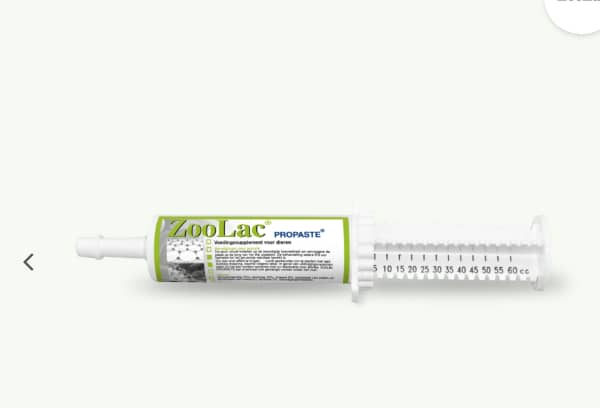What it is: Zoolac Propaste is a liquid probiotic supplement for dogs containing a blend of beneficial bacteria, primarily Lactobacillus acidophilus. it contains 4.2 billion bacteria per ml: Lactobacillus Pediococcus, Bacillus, Lactobacillus acidophilus, plus vegetable oil, lecithin and stabiliser (E551B). Therefore, Zoolac Propaste is considered best Probiotics for Dogs.
When to give Zoolac Propaste to dogs?
During and After Antibiotic Treatment:
Antibiotics, while necessary for treating infections, can disrupt the balance of gut bacteria. Probiotics can help restore this balance.
- Digestive Upsets:
- If your dog experiences diarrhea, gas, or bloating, probiotics may help alleviate these symptoms by promoting a healthy gut flora.
- Stressful Situations:
- Dietary Changes:
- When transitioning your dog to a new food, probiotics can help ease the adjustment and prevent digestive upset.
- To support Immune health:
- Because a large portion of a dogs immune system resides in the gut, maintaining a healthy gut biome, can help bolster the dogs immune system.
- When dealing with IBD:
- Probiotics can help to regulate and improve the gut biome of dogs suffering from IBD.
Important Considerations:
- Veterinary Consultation:
- It’s always best to consult with your veterinarian before giving your dog any probiotic supplements. They can help determine if probiotics are appropriate and recommend the right product and dosage.
- Strain Specificity:
- Different strains of probiotics have different effects. Your veterinarian can help you choose a product with strains that are beneficial for your dog’s specific needs.
- Quality of Product:
- Choose a high-quality probiotic supplement from a reputable manufacturer.
- Puppies:
- Probiotics can be safe and beneficial for puppies, but it’s essential to consult with your veterinarian for guidance.
In summary:
Probiotics can be a valuable tool for supporting your dog’s digestive health, but it’s crucial to use them appropriately and under the guidance of your veterinarian.
Role of Lactobacillus and Pediococcus Probiotics for Dogs
Lactobacillus and Pediococcus are both genera of lactic acid bacteria (LAB), which are known for their beneficial effects on the gut microbiome. In dogs, as in other animals and humans, these bacteria play a role in maintaining digestive health. Here’s a summary of their significance:
General Role of LAB in Dogs:
- Gut Microbiome Balance:
- LAB contribute to a healthy balance of microorganisms in the canine gut. This balance is crucial for proper digestion, nutrient absorption, and immune function.
- Probiotic Effects:
- When administered in adequate amounts, certain strains of Lactobacillus and Pediococcus can act as probiotics, providing health benefits to the host.
- Immune System Support:
- A healthy gut microbiome, supported by LAB, plays a vital role in the dog’s immune response.
- Digestive Health:
- LAB can help prevent or alleviate digestive issues like diarrhea by competing with harmful bacteria and producing substances that inhibit their growth.
Specific Considerations for Lactobacillus and Pediococcus in probiotics for dogs:
- Lactobacillus:
- This is a very common and well-studied genus of LAB.
- Various Lactobacillus strains are used in probiotic supplements for dogs, often to address gastrointestinal problems.
- They can help improve stool quality and reduce the duration of diarrhea.
- Pediococcus:
- Pediococcus species are also found in the canine gut and can contribute to a healthy microbiome.
- Research indicates that certain Pediococcus strains have probiotic potential, including antioxidant and antibacterial properties.
- Studies are being done to show how Pediococcus acidilactici can improve gut health in dogs.
- Research trends:
- There is on going research to identify specific strains of both Lactobacillus, and Pediococcus, that are species specific to canines. This is to help create more effective probiotic supplements for dogs.
Key Points:
- The gut microbiome is essential for canine health, and LAB play a significant role in maintaining its balance.
- Probiotic supplements containing Lactobacillus and Pediococcus can be beneficial for dogs with digestive issues.
- It’s always advisable to consult with a veterinarian before giving your dog any probiotic supplements.
How it works: Probiotics help maintain a healthy balance of good bacteria in the gut. This is important for digestion, nutrient absorption, and overall gut health.
Benefits: Zoolac Propaste is often used to:
- Support digestive health
- Improve stool quality
- Reduce diarrhea
- Aid in recovery from antibiotic use (which can disrupt gut flora)
- Boost the immune system (gut health is closely linked to immune function)
Usage: It’s typically administered directly into the pet’s mouth or mixed with their food.
Safety: Generally considered safe for most pets, but it’s always a good idea to consult with your veterinarian before starting any new supplement, especially if your pet has underlying health conditions.
there’s research indicating potential benefits of Lactobacillus acidophilus in dogs. Here’s a summary of key findings:
Key Research Areas:
- Gastrointestinal Health:
- Studies have shown that L. acidophilus can help modulate the gut microbiome in dogs, potentially improving digestive health.
- Research indicates that it can contribute to:
- Reducing the duration and severity of diarrhea.
- Improving stool quality.
- Balancing the gut flora by competing with harmful bacteria.
- Immune System Support:
- A healthy gut microbiome is closely linked to a strong immune system.
- Some studies suggest that L. acidophilus may help enhance immune responses in dogs.
- Oral Health:
- There is research showing that certain strains of L. acidophilus can have a positive effect on oral health in dogs, by reducing oral pathogens.
- One example is the research that showed how L. acidophilus can reduce Porphyromonas gingivalis, a critical factor of periodontitis.
- Research Paper example:
- A study published in the American Journal of Veterinary Research evaluated the effects of a probiotic strain of Lactobacillus acidophilus in healthy adult dogs. It found that the probiotic could survive transit through the gastrointestinal tract, populate the colon, and was associated with changes in intestinal and systemic parameters, suggesting potential benefits for intestinal health and immune function.
- Here is a link to that study: https://pubmed.ncbi.nlm.nih.gov/15027683/
Important Considerations:
- Strain Specificity:
- The effects of probiotics can be strain-specific, meaning that different strains of L. acidophilus may have different effects.
- Individual Variation:
- Like humans, dogs can respond differently to probiotics.
- Veterinary Guidance:
- It’s always recommended to consult with a veterinarian before giving your dog any probiotic supplements.
In essence, while research shows promising benefits of L. acidophilus for dogs, it’s essential to consider strain specificity, individual variation, and seek veterinary guidance.

Dr. Suranjan Sarkar is a veterinarian and also a writer and editor for both print and digital with a love for travel, animal, and architecture. Much of his writing has focused on human and animal health and welfare. A life-long pet owner, His two favorite canine quotes are, “Be the kind of person your dog thinks you are,” and “Dogs communicate their feelings honestly and directly. There’s no hidden agenda or manipulation.”










Pingback: Inflammatory Bowel Disease in Dogs: Symptoms, Diagnosis, and Treatment - Pluto Pet Clinics